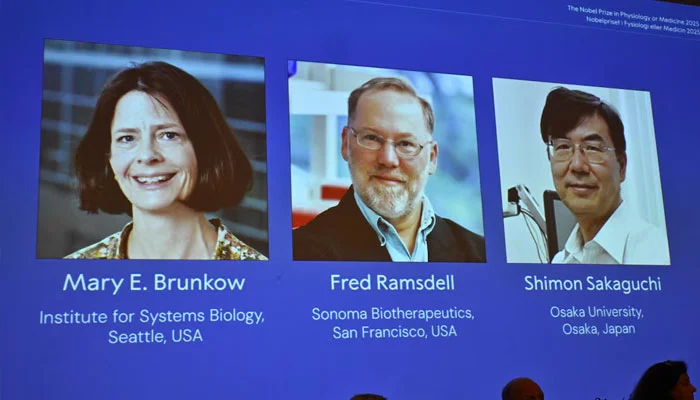US-Japanese researchers win top scientific award for identifying regulatory T-cells, opening new doors for autoimmune and cancer treatments. Nobel committee jokes about unreachable US laureates.
STOCKHOLM, SWEDEN
A trio of researchers from the United States and Japan have been awarded the Nobel Prize in Medicine for their groundbreaking work on how the immune system regulates itself, identifying the critical cells that function as the body’s internal “security guards.” The discovery offers a new frontier in treating complex conditions from autoimmune diseases to cancer.
The laureates are the United States’ Mary E. Brunkow and Fred Ramsdell, and Japan’s Shimon Sakaguchi. The Nobel jury stated that their findings were decisive in understanding how the immune system functions and, crucially, why the body does not routinely attack its own tissues, leading to serious autoimmune diseases.
Speaking to Swedish broadcaster Sveriges Radio, Shimon Sakaguchi, a professor at the Immunology Frontier Research Centre in Osaka, expressed his delight: “It’s an honour for me. I’m looking forward to visiting Stockholm in December” to formally receive the award.
In a moment of light professional humour, the Nobel committee acknowledged they were unable to reach the two US-based laureates to deliver the news in person. Thomas Perlmann, the head of the Nobel Assembly, quipped during the announcement, “If you hear this, call me.”
A Breakthrough in Self-Tolerance
The three scientists were recognised for their research identifying the immune system’s vital checks and balances, specifically the discovery of regulatory T-cells. Their work concerns “peripheral immune tolerance,” the crucial mechanism that prevents the immune system from causing harm to the body. This breakthrough has already sparked a new field of research and led to the development of potential medical treatments currently in clinical trials.
“The hope is to be able to treat or cure autoimmune diseases, provide more effective cancer treatments and prevent serious complications after stem cell transplants,” the jury affirmed, highlighting the profound human implications of the discovery.
Sakaguchi made the initial key discovery in 1995. At the time, much of the scientific community was convinced that immune tolerance developed primarily through a process where potentially harmful immune cells were simply eliminated in the thymus—a process known as “central tolerance.” Sakaguchi, 74, shattered this prevailing view by demonstrating the system was far more complex and uncovered a previously unknown class of immune cells that actively protect the body from attacking itself.
Brunkow, 61, a senior project manager at the Institute for Systems Biology in Seattle, and Ramsdell, 64, a senior advisor at Sonoma Biotherapeutics in San Francisco, made the next crucial link in 2001. They managed to explain why certain lab mice were particularly susceptible to autoimmune diseases.
“They had discovered that mice have a mutation in a gene that they named Foxp3,” the jury explained. “They also showed that mutations in the human equivalent of this gene cause a serious autoimmune disease, IPEX.” Two years later, Sakaguchi successfully connected these threads, leading to the collective recognition.
The trio will share the $1.2 million prize money, along with a diploma and a gold medal, at a formal ceremony in Stockholm on December 10.
US Research and Budget Cuts
The prominence of US-affiliated researchers in the Nobel science categories has long been a feature, owing in large part to the country’s sustained investment in basic science and its tradition of academic freedom. However, the future of this dominance is being questioned following significant budget cuts to science programmes announced by President Donald Trump’s administration.
According to the independent database Grant Watch, the US National Institutes of Health (NIH) has cut 2,100 research grants since January, amounting to approximately $9.5 billion in funds.
Thomas Perlmann, the secretary general of the Medicine Nobel committee, noted that the US having the most Nobel laureates is “no coincidence.” But, he cautioned, “there is now a creeping sense of uncertainty about the US’ willingness to maintain their leading position in research.”
Meanwhile, President Trump has openly voiced his ambition to win a Nobel for himself—the Peace Prize. Nobel experts, however, remain deeply sceptical, suggesting his “America First” policies and divisive rhetoric stand in stark contrast to the prize’s ideals.
“It’s completely unthinkable,” historian Oeivind Stenersen told AFP, stressing that Trump “is in many ways the opposite of the ideals that the Nobel Prize represents,” citing the necessity of “multilateral cooperation.” Stenersen concluded, Trump “follows his own path, unilaterally.”
This year’s Peace Prize speculation has focused on humanitarian efforts, with Sudan’s volunteer networks—the Emergency Response Rooms (ERR), which help civilians survive war and famine—seen as a strong contender, alongside global media watchdogs and Yulia Navalnaya, the widow of late Kremlin critic Alexei Navalny.



